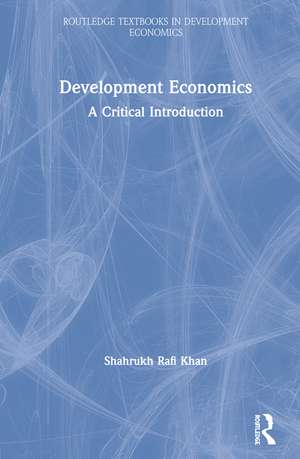Development Economics: A Critical Introduction: Routledge Textbooks in Development Economics
Autor Shahrukh Rafi Khanen Limba Engleză Hardback – 5 noi 2019
This book will fill this gap, presenting all the core material needed to teach development economics in a one semester course, while also addressing the need for a new economics and offering flexibility to instructors. Rather than taking the typical approach of organizing by topic, the book uses theories and debates to guide its structure. This will allow students to see different perspectives on key development questions, and therefore to understand more fully the contested nature of many key areas of development economics.
The book can be used as a standalone textbook on development economics, or to accompany a more traditional text.
| Toate formatele și edițiile | Preț | Express |
|---|---|---|
| Paperback (1) | 402.11 lei 6-8 săpt. | |
| Taylor & Francis – 6 noi 2019 | 402.11 lei 6-8 săpt. | |
| Hardback (1) | 1016.86 lei 6-8 săpt. | |
| Taylor & Francis – 5 noi 2019 | 1016.86 lei 6-8 săpt. |
Preț: 1016.86 lei
Preț vechi: 1240.07 lei
-18% Nou
Puncte Express: 1525
Preț estimativ în valută:
194.64€ • 211.49$ • 163.60£
194.64€ • 211.49$ • 163.60£
Carte tipărită la comandă
Livrare economică 21 aprilie-05 mai
Preluare comenzi: 021 569.72.76
Specificații
ISBN-13: 9780415787352
ISBN-10: 0415787351
Pagini: 418
Ilustrații: 66
Dimensiuni: 156 x 234 x 28 mm
Greutate: 0.93 kg
Ediția:1
Editura: Taylor & Francis
Colecția Routledge
Seria Routledge Textbooks in Development Economics
Locul publicării:Oxford, United Kingdom
ISBN-10: 0415787351
Pagini: 418
Ilustrații: 66
Dimensiuni: 156 x 234 x 28 mm
Greutate: 0.93 kg
Ediția:1
Editura: Taylor & Francis
Colecția Routledge
Seria Routledge Textbooks in Development Economics
Locul publicării:Oxford, United Kingdom
Public țintă
Postgraduate and UndergraduateCuprins
Part I: Background
1: Introduction
2: Data and their use in development economics
3: Commonalities and differences among low and low middle income countries
4: Poverty, inequality and some proposed solutions
Part II: Key approaches to economic development and the middle income trap
5: Classical and radical antecedents of development economics
6: Developmentalists and developmentalism
7: Neo-Marxism, structuralism and dependency theory
8: Neoliberalism and its critics
9: New developmentalism: industrial policy, policy space and premature deindustrialization debates
10: Is there a middle income trap?
Part III: How key approaches play into some key debates
11: Debates on foreign aid
12: Debates on foreign direct investment
13: Debates on agriculture/sustainable agriculture
14: Debates on technology and addressing environmental problems/green industrial policy
Part IV: Conclusion
15: Catch-up growth: finding a trigger
1: Introduction
2: Data and their use in development economics
3: Commonalities and differences among low and low middle income countries
4: Poverty, inequality and some proposed solutions
Part II: Key approaches to economic development and the middle income trap
5: Classical and radical antecedents of development economics
6: Developmentalists and developmentalism
7: Neo-Marxism, structuralism and dependency theory
8: Neoliberalism and its critics
9: New developmentalism: industrial policy, policy space and premature deindustrialization debates
10: Is there a middle income trap?
Part III: How key approaches play into some key debates
11: Debates on foreign aid
12: Debates on foreign direct investment
13: Debates on agriculture/sustainable agriculture
14: Debates on technology and addressing environmental problems/green industrial policy
Part IV: Conclusion
15: Catch-up growth: finding a trigger
Notă biografică
Shahrukh Rafi Khan is currently Research Associate at Mount Holyoke College, USA. He formerly served as executive director of the Sustainable Development Policy Institute, Islamabad. He has also formerly taught at the University of Utah and Vassar College and served as Copeland Fellow at Amherst College. He has published extensively in refereed journals and authored and edited numerous books. He has twice won The Akhtar Hameed Khan book prize and engaged in academic consulting for several international organizations.
Recenzii
"The book offers a very easy and good read for beginners and the seminary questions at the end of each chapter represent a useful tool for academic tutors at university level."
- Mohammad Alsaghir, Markfield Institute of Higher Education, UK
"Dr. Shahrukh Khan's new textbook is a fantastic book for teachers and students trying to get into the field of development economics. [...] What sets this work apart is the centrality it places on covering all of the diversity in the field of development economics. From neo-Marxists to neo-liberals and everything in between, the book honors and critiques the value of each approach to understanding development. The book is easily read, engaging, and perfect for anyone looking to teach an intro to development class."
- Sidney Michelini, New Books in Economics Podcast on the New Books Network (https://podcasts.apple.com/us/podcast/shahrukh-khan-development-economics-critical-introduction/id425187524)
- Mohammad Alsaghir, Markfield Institute of Higher Education, UK
"Dr. Shahrukh Khan's new textbook is a fantastic book for teachers and students trying to get into the field of development economics. [...] What sets this work apart is the centrality it places on covering all of the diversity in the field of development economics. From neo-Marxists to neo-liberals and everything in between, the book honors and critiques the value of each approach to understanding development. The book is easily read, engaging, and perfect for anyone looking to teach an intro to development class."
- Sidney Michelini, New Books in Economics Podcast on the New Books Network (https://podcasts.apple.com/us/podcast/shahrukh-khan-development-economics-critical-introduction/id425187524)
Descriere
This book presents all the core material needed to teach development economics in a one semester course. The book allows students to see different perspectives on key development questions, and therefore to understand more fully the contested nature of many key areas of development economics.






